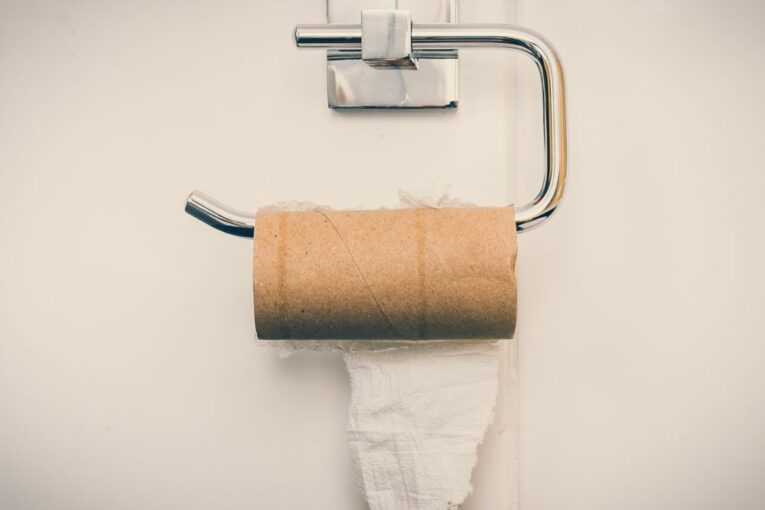
A family of four’s annual toilet paper use generates about the same amount of carbon as cutting down 27 trees or flying on a jet from Toronto to Vancouver.
Those are the kind of statistics that might make you want to sit down, on the throne, perhaps, with a new appreciation of what we’re flushing away. The numbers come from the New York-based Natural Resources Defense Council, a non-profit environmental advocacy group.
“There are plenty of toilet paper and tissue products out there today that have a much smaller budget than companies like Procter & Gamble,” Shelley Vinyard, a campaign manager in the council’s Canada Project, said in a statement.
“For Procter & Gamble to say that they can’t fix this problem and they can’t take responsibility for the role that they’re playing in fuelling the climate crisis and forest destruction is an abdication of their own responsibility.”
Cutting down trees to make toilet paper reduces the ability of forests to absorb carbon out of the air. Canada’s boreal forest stores nearly twice as much carbon as all the world’s oil reserves combined, according to the report. Carbon dioxide is a greenhouse gas blamed in part for the climate change raising the planet’s temperature.
The quirky Who Gives a Crap brand originally out of Melbourne, and the Green Forest marque, founded in Wisconsin 30 years ago, sported top marks with A plusses on the NRDC list. They scored almost a perfect 600 points for being made entirely of recycled fibres that are more than 90 per cent post-consumer (pre-consumer recyclables are used primarily in manufacturing) and bleached with a less toxic process.
P&G, Kimberly-Clark, Georgia-Pacific LLC, Amazon.com, Costco Wholesale Corp. and Walmart Inc. all earned Fs for some of their brands. Those products are made of 100 per cent virgin fibres bleached with a process releasing cancer-causing dioxins. They scored zero.
Of perhaps greater impact than personal guilt while on the go is how Canadian securities regulators increasingly demand listed companies to report the environmental credentials of their products. The guidelines require public companies to disclose information that, if omitted or misstated, would likely influence a reasonable investor’s decision to buy, sell or hold a security.
Large producers such P&G, Kimberly-Clark and Georgia-Pacific are based in the United States, but there the Securities and Exchange Commission is now weighing whether to require companies to disclose climate-change related risks in their annual reports, a move that could open them to court challenges.
“There are plenty of brands out there that are made from recycled fibre and alternative fibres that have one-third the climate impact of toilet paper that comes from virgin forest fibre,” Jennifer Skene, lawyer for the council’s Canada Project, said in a statement.
“When companies decide to continue producing toilet paper made from forests, and when retailers decide to stock their shelves with toilet paper made from forests, they’re making a choice to sacrifice our climate and our world’s forest all for something that gets flushed away.”
The NRDC ranked 44 rolls in total, with 11 earning As or higher. In addition to Who Gives a Crap, Green Forest and Kimberly-Clark, the top achievers included American brands which may be difficult to find in Canada: Whole Foods, Natural Value, Seventh Generation, Trader Joe’s, Target and Publix.
It also reviewed tissues made with bamboo fibre for the first time. Bamboo can be a complicated choice. it grows rapidly and generally has a smaller ecological footprint, but some bamboo plantations were created after levelling primary forests. Those can be weeded out by certification from organizations such as the Forest Stewardship Council, which evaluates forest use according to human rights and ecological impacts.
The NRDC also ranked paper towels and facial tissues. Thrive Market, Target and Green Forest paper towels earned A plusses. P&G’s Bounty, Kimberly-Clark’s Viva, Costco, Amazon and Walmart got Fs.
Facial tissues ranked similarly. Kleenex got an F.
As North American forests are being clear-cut at a rate of one million acres a year, P&G and Kimberly-Clark increased their purchases of Canadian wood pulp in the past year in a “tree-to-toilet pipeline” that must be dismantled to save centuries-old trees and the climate, the council says.
“The toilet paper we buy is a climate decision,” Vinyard said.
“When you choose to buy a product that’s made from recycled content you are minimizing your own carbon footprint. You’re voting with your dollars and telling tissue manufacturers that what you’re looking for is something that doesn’t destroy forests and harm our climate.”
You can read more of the news on source
